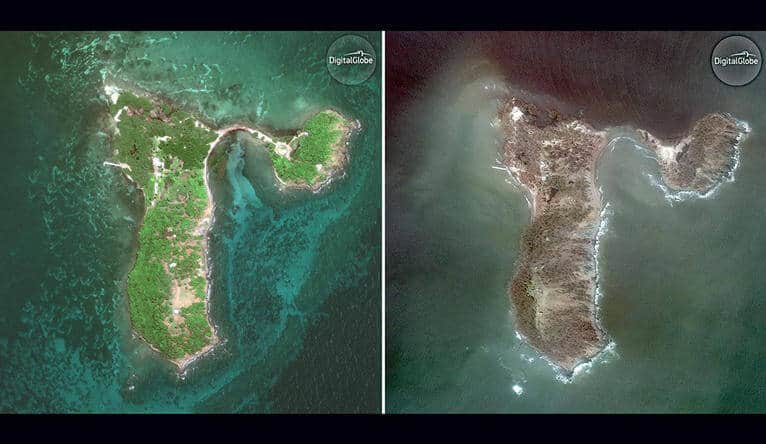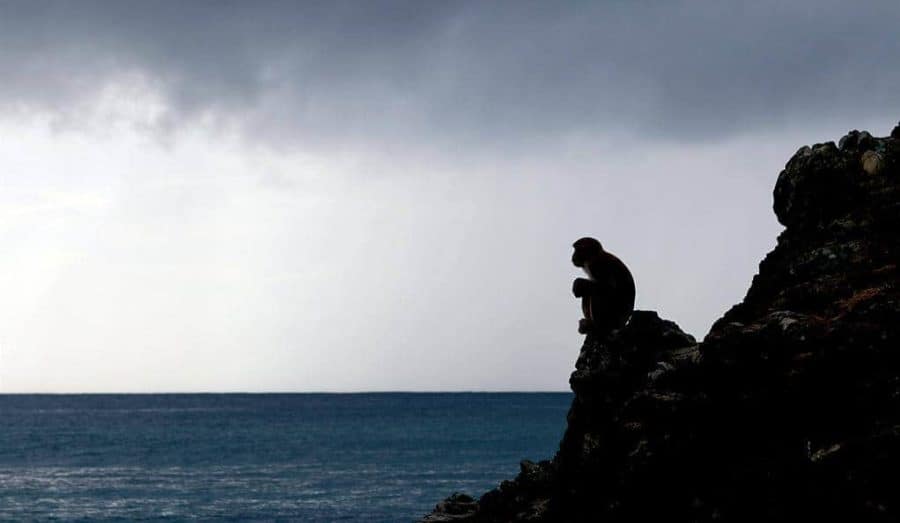A colony of monkeys off the coast of Puerto Rico mostly survived a direct hit by Hurricane Maria but an international team of researchers who have studied the 1,000 free-ranging Rhesus monkeys are scrambling to assist survivors and the staff who serve them on the tiny island, which now lacks vegetation and fresh water.
“Cayo Santiago is a small island off the coast of mainland Puerto Rico, and the monkeys have been subjects in scientific research since the 1930s, which makes this site the longest running primate field site in the world,” said Laurie Santos, professor of psychology at Yale University, who has worked at the site for over 23 years.
On Sept. 20, the tropical island on the southeast coast was hit with 150-miles-per-hour winds from Maria, a Category 4 hurricane which devastated Puerto Rico and other areas of the Caribbean.
“Since the island is only 94 acres across, there wouldn’t have been many places for the animals to take refuge,” said Lauren Brent, assistant professor at the University of Exeter’s Centre for Research in Animal Behaviour.
However, support staff who managed to reach the island say all six social groups that call the island home have been accounted for.

“Although the animals have braved the storm, the vegetation on the island has been decimated, and the infrastructure providing life-sustaining fresh water has been destroyed” said Noah Snyder-Mackler, assistant professor of psychology at the University of Washington.
And the people living in surrounding communities are suffering even more. The ongoing humanitarian crisis in Puerto Rico — which currently has limited electricity, fuel, food, and water — has had a dire impact on the neighboring community of Punta Santiago and the region of Humacao in general. Many of the staff who live near the site have lost everythingand limited phone service has made it impossible to contact others.
The site and the staff who support it have furthered groundbreaking research that cannot be done almost anywhere else, researchers say. The monkeys roam free on a natural tropical island, but also are so habituated to humans that researchers have unprecedented access into their daily lives. This microcosm of monkey society has shed light onto questions as diverse as how they think, choose friends, and choose mates, as well as the genetic underpinnings of these diverse behaviors.
A team of researchers from several institutions — Yale, New York University, University of Buffalo, University of Exeter, University of Michigan, University of Pennsylvania, University of Puerto Rico, and University of Washington — are organizing a relief effort to help both staff and monkeys.
“This fragile population somehow weathered this awful storm, but we need to act quickly to save them and the important scientific possibilities they represent,” noted Michael Platt, the James S. Riepe University Professor at the University of Pennsylvania. “Unless we immediately rebuild the infrastructure on the island as well as the lives of the people that support it, this important resource may disappear.”
Two GoFundMe sites have been set up in conjunction with this relief effort: Cayo Santiago Monkeys: Maria Relief and Relief for Cayo Santiago Employees
If our reporting has informed or inspired you, please consider making a donation. Every contribution, no matter the size, empowers us to continue delivering accurate, engaging, and trustworthy science and medical news. Independent journalism requires time, effort, and resources—your support ensures we can keep uncovering the stories that matter most to you.
Join us in making knowledge accessible and impactful. Thank you for standing with us!

